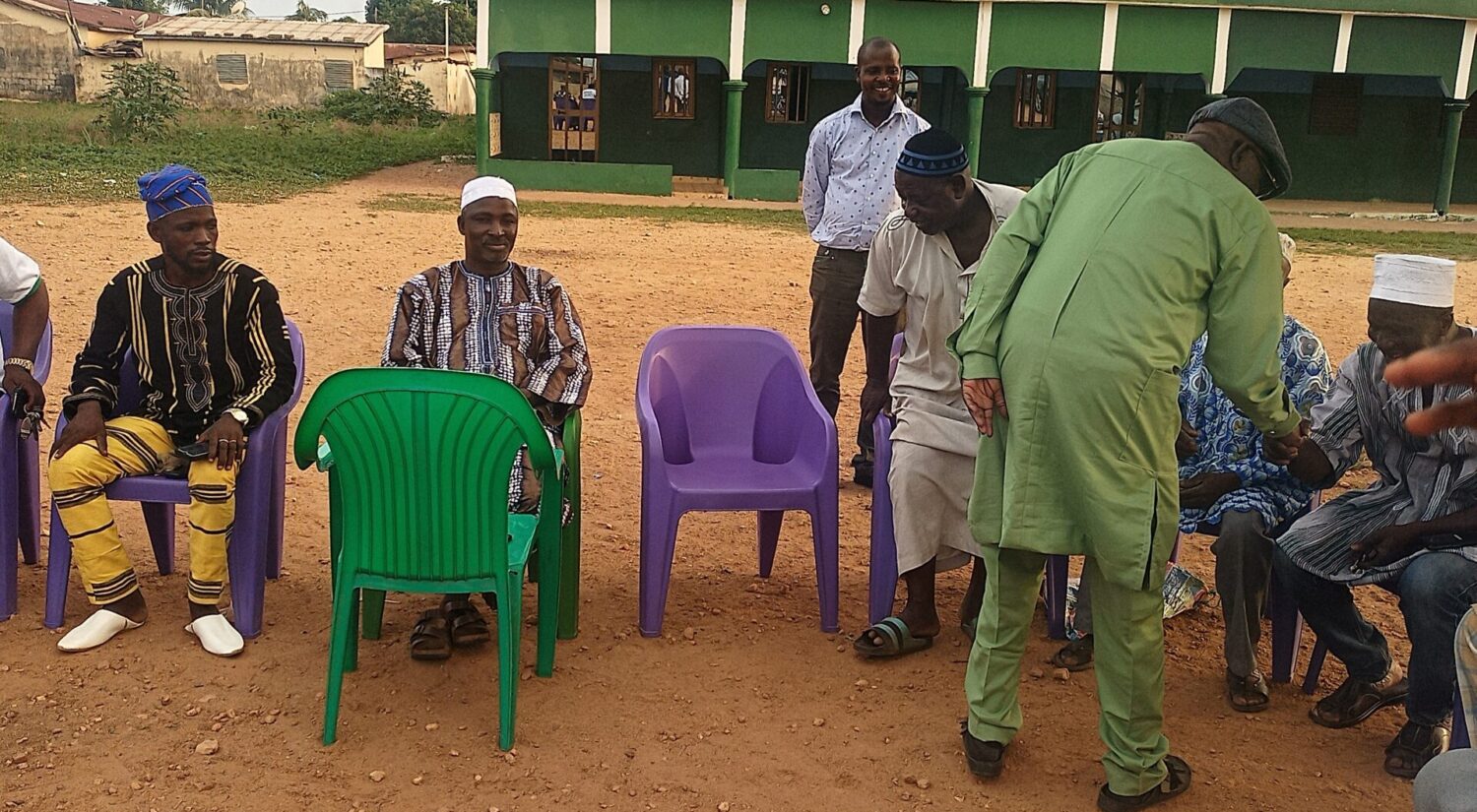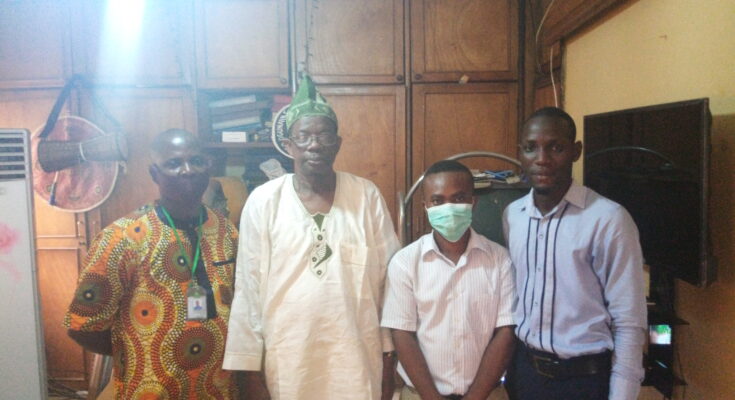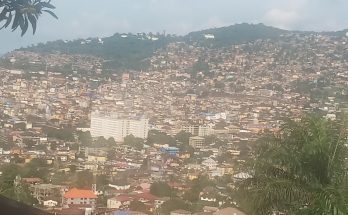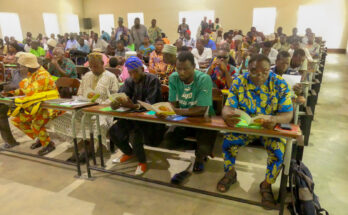LIFA team paid a knowledge sharing visit to chief Folorunso Ogunnaike, a front line First generation Integrated poultry farmers in Nigeria on the 28th of July, 2020. LIFA has identified the compendium of native intelligent on livestock nutrition and health in the custody of this erudite livestock entrepreneur
LIFA learned of the early initiatives of Chief Ogunnaike in the management of viral and bacterial diseases with locally available nutraceuticals and confirmed their empirical success. This farmer did many in-house experimental farm trials to arrive at herbal management of early devastating Gumboro disease, bacteria and viral diseases of poultry in the late seventies to early nineties.
LIFA was informed of the farmer’s early utilisation of cotton seed, cassava peals and palm kernel cake as alternative to energy and protein sources of poultry feed formulation in Nigeria. Though he was initially criticised but no sooner was he copied by many livestock farmers in Nigeria
His reason for using them then was that our country is blessed abundantly with these raw materials, and we’re massively wasting away in Nigeria. He believed that if these raw materials were to be abundant in developed countries they would have been turned to gold mines and good sources of foreign revenue.
These innovations need further value addition by researchers and at LIFA we believe that these knowledge found in the Town can be harnessed by the Gowns for further development to the growth of this industry.

Dr Sola Ogunsanya: Sir, how did your company come into establishment?
Chief Folorunsho Ogunniake: I happen to be a product of the University of Ibadan teaching and research farm. I left the place in 1968 and joined a company known as progressive group limited. I served in the organization for the period of 9 years, thereafter I opted out and started my own business through and with the help of my then farm director, the person of Late Chief Oladunwo Ogunsanya. Have been in this poultry business for almost half a century (Over 50 years).
Dr Sola Ogunsanya: What are the challenges encountered in the establishment of the farm?
Chief Folorunsho Ogunniake: When we talk of poultry as a Livestock, it usually is hazardous in nature. The challenges are numerous but with endurance and perseverance we shall surely become victorious for a determined mind. As have said the challenges are numerous, year in year out poultry farmers are bound to face a problem one way or the other. If there is scarcity of feed today, it may be glut, next year it may be disease outbreak, and it’s always challenges up and down. But with endurance and perseverance, we shall overcome any problem.
Even though many people fell off the road but through the grace of God, we were able to be where we are today. So when we started our intention was to look for people of likely mind. We started on a very small scale and we have grown gradually and today we are one among the medium poultry producers in Nigeria.
Dr Sola Ogunsanya: What pre-form the name of the company?
Chief Folorunsho Ogunniake: When we started, my name was Folorunsho Ogunnaike, the Fol is the first three letters of my name, and then hope is hope in the lord. We believe that with God all things are possible. This is where Folhope limited company falls in.
Dr Sola Ogunsanya: Do you own Folhope Limited located in Ogun State?
Chief Folorunsho Ogunnaike: We occupy both Oyo and Ogun State. I am from Ogun State, Ijebu Igbo in Ogun State. I just believe that since I am from that state, I should have something in the state.
Dr Sola Ogunsanya: Most farmers opted out of the business because of mortality, do you also incur disease outbreak in the poultry business?

Chief Folorunsho Ogunnaike: Yes, an uncountable number of times, you see when we talk of poultry, it’s very hazardous in nature but with determination, honesty and proven integrity with perseverance, you will surely scale through, but you need endurance. In those days, let’s discuss poultry immunity. In the past, poultry immunity is much better than what it is right now. In the early 70s, we had just four types of vaccination applicable in the poultry birds.
- NDV intraocular applicable at day one
- Fowl pox vaccine applicable at day fifteen
- NDV Komorov applicable at six weeks
- Fowl typhoid vaccine applicable at 8-10 weeks
Now even the fowl typhoid is optional, you may apply it and you may not. If eventually you have an outbreak of typhoid, paratyphoid pulorum, all these are under salmonelosis, then you apply ofolidon or ofolidom, it works as a magic. But all these have become history. Right now we have to apply almost 15-20 vaccinations into the birds before they can reach the point of lay. Thereby giving them multiple stress, this results in low immunity. That is why we have so many people running out of the business due to casualty. I think it has to do with luck as well. Another area is the issue of feeding, when cost of production is higher than the market in price, one is bound to be discouraged. There was a certain time we faced scarcity of feeds as at that time, we have to look for mixing materials as a substitute that is a non conversional feed ingredient to augment/replace conventional feed ingredients that are not readily available. This is the time we look into the possibility of looking into alternate seed plants, ewe Moran (yoruba name) etc. A good successful scientist should be able to have a good rapport with nature. Nature and science work together, they are on the same line and when we talk of nature, we talk of the wisdom of God.
Some people call themselves scientists and at the same time they say there is no God, with my own personal experience, if God is not on your side, science will fail. The final say belongs to God Almighty when it comes to science, research and technology. So therefore nature and science work hand in hand. From experience, to know the plants, herbs and roots that are beneficial for mammals all you need to do is to take watch. When you have identified plants fed by insects, you have to know for sure that the plants are edible and useful for mammals. If you go into research on the plants you will be able to know what it contains.
Initially there was no vaccine against Gumboro, it was later discovered of which we are importing it to the country. So also there was no vaccination against marek’s diseases then, later they invented it and we are importing it and applying it but when we talk about application of vaccine, it all depends on mode of application.
We have so many conditions that can warrant failure of vaccine or potency of the vaccine. Handling, mode of vaccination, then potency of the vaccine itself is another problem. If we have misapplication of vaccination, it may not give required immunity. The potency may be manufacturing failure in the export during the manufacturing or mishandling. If you apply it, it will not work. When we talk of livestock, the only person that has the final say is God Almighty.
Dr Sola Ogunsanya: You made some intervention(s) during some of this outbreak. For medication, what are the medications you have tried on your own in the farm?, did they perform well and are you still using them right now?
Chief Folorunsho Ogunnaike: We have tried so many. As I have said earlier, when you see insect feeds on any plant, there is purpose for it. When it comes to research, you can’t do much, but we research birds. For example, if you try on five birds and it kills all the birds, if you try on many birds, it will kill them all. Likewise, if they survive, so means it’s ok. If you want to be a successful poultry farmer, you should be in the position of discovering yourself.
Dr Sola Ogunsanya: Sir, can you mention the medication(s) you have tried on your farm?
Chief Folorunsho Ogunnaike: When we talk about medication, we give them our own code. We have vegi 1, 2, 3, 4. It is a combination of so many herbs and we use it as an injection to the birds. We will apply it with a few numbers of birds for experimental purposes. Local medicine depends on your volume, it’s ok for small poultry farms.
Dr Sola Ogunsanya: Sir, what advantage do traditional medicine have over synthetic medicine?, can they be combined?
Chief Folorunsho Ogunnaike: There is nothing bad in combining the two but it must not be at the same time. The advantage is that it will be able to reduce cost of production. That’s the only advantage.
Dr Sola Ogunsanya: Sir, your advice to small scale farmers?
Chief Folorunsho Ogunnaike: It depends; some people are ready to learn while many are not ready to learn. We believe in orthodox. Anybody that is in poultry or livestock production should look for the possibility of using local available raw materials to sustain the business instead of using conventional feeds all the time.

LIFA team appreciated the compendium of knowledge shared by Chief Ogunniake to the poultry farmers (both large and small scale farmers) during our visit to his office. Kudos to you sir, and we thank you for granting Livestock Industry Foundation for Africa this opportunity.




